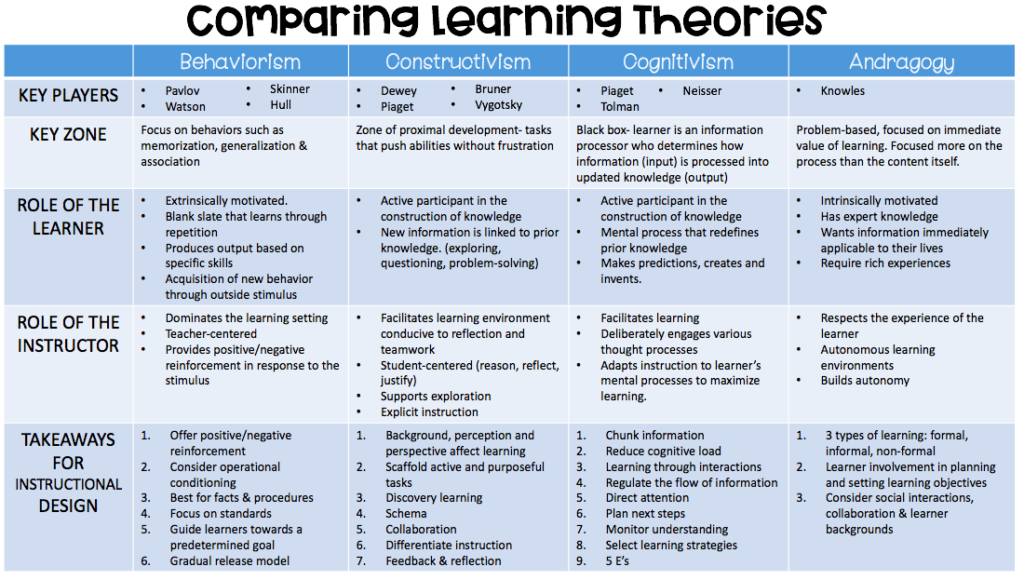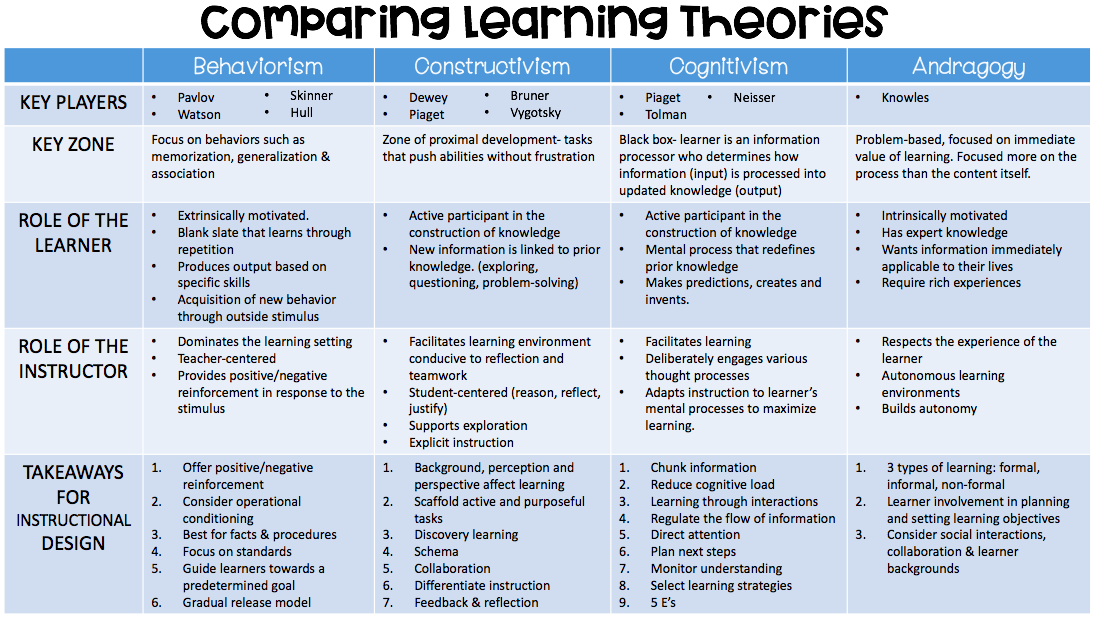There are four major learning theories. The following theories have been debated for decades. They all have complimentary and contrasting views of key zones, knowledge, the learner, the instructor, and the learning environment, which have significant implications for teaching methods and instructional design. It is important when designing instruction that we use a mixture theories as one is not superior over the other. Their application depends on many factors such as the type of learner, the content and the learning objectives. As an educator for the past 18 years, I have used them all in some capacity or another.

Theories In Practice
Behaviorism
All learning theories are used in instructional design today. Behaviorism is still exclusively used with child learners and young adults. It is mainly used with low-level skills such as the memorization of facts, multiple-choice testing, and procedural practice. Another example of behaviorism is gamification which employs a behaviorist system of rewards and badges to incentivize engagement among learners of all ages.
Cognitivism
Cognitivism also plays a role in designing instruction for today’s learners. Cognitivists detail several considerations to take into account to help minimize cognitive load and maximize learning retention. These include organization, elaboration, and schema. Strategies include chunking and segmenting information, limiting redundant information, removing unnecessary information, using metacognition (thinking about thinking), and motivational strategies.
Constructivism
With its emphasis on learners’ previous experiences, constructivism is often employed to teach more complex tasks. The goal is to create autonomous learners, facilitate thinking and problem-solving skills that can be transferred, and activate learners to construct their own knowledge. Constructivist strategies include student interest rather than textbook content, complex problem-solving, experimentation, skill-based, and open-ended approaches, discovery, and guided learning.
Andragogy
Andragogy(adult learning), similar to pedagogy(child learning) plays a role in designing learning for adult learners. Knowles describes andragogy as the art and science of adult learning. Four principals need to be kept in mind when designing instruction for adults. First, adults need to be involved in the planning of instruction and evaluation. Second, adults have vast background knowledge, therefore, experience is the basis for learning. Third, adults flourish when learning can be applied immediately and needs to be relevant to their lives. Finally, adult learning should be problem/project based rather than content based. There are also six assumptions of adult learning including self-concept, learner experience, readiness to learn, orientation to learning, learner motivation, problem-centered focus. Strategies include building in student voice and choice, having students create action plans with goal setting and share the “why”.
In practice, elements of all four learning theories are integrated into today’s instructional design in different ways. Each has its own emphasis with contrasting views of the role of the instructor, role of the learner, key zones, and learning environment.
References
Mcleod, S. (2021). Cognitive Approach | Simply Psychology. Retrieved 15 May 2021, from https://www.simplypsychology.org/cognitive.html?ezoic_amp=1&ref=binfind.com%2Fweb
Bland, J., 2021. 12 Principles of Multimedia Learning. [online] Academic Outreach. Available at: <https://elearning.olemiss.edu/12-principles-of-multimedia-learning/> [Accessed 15 May 2021].
Watson, J. B., & Rayner, R. (1920). Conditioned emotional reactions. Journal of Experimental Psychology, 3, 1-14.
Drew PhD, C. (2021). Behaviorism-Skinner’s Education Learning Theory. Retrieved 28 April 2021, from https://helpfulprofessor.com/behaviorism/
Kurt, S., 2021. Jean Piaget and His Theory & Stages of Cognitive Development – Educational Technology. [online] Educational Technology. Available at: <https://educationaltechnology.net/jean-piaget-and-his-theory-stages-of-cognitive-development/> [Accessed 2 May 2021].
McLeod, S., 2021. The Zone of Proximal Development and Scaffolding. [online] Simplypsychology.org. Available at: <https://www.simplypsychology.org/Zone-of-Proximal-Development.html> [Accessed 30 April 2021].
Yupangco, J. (2021). The Andragogy Secret: How To Use Adult Learning Theory To Drive L&D Engagement Success. Retrieved 27 May 2021, from https://www.lambdasolutions.net/blog/andragogy-secret-how-to-use-adult-learning-theory-to-drive-ld-engagement-success
The Adult Learning Theory – Andragogy – of Malcolm Knowles – eLearning Industry. (2021). Retrieved 27 May 2021, from https://elearningindustry.com/the-adult-learning-theory-andragogy-of-malcolm-knowles
